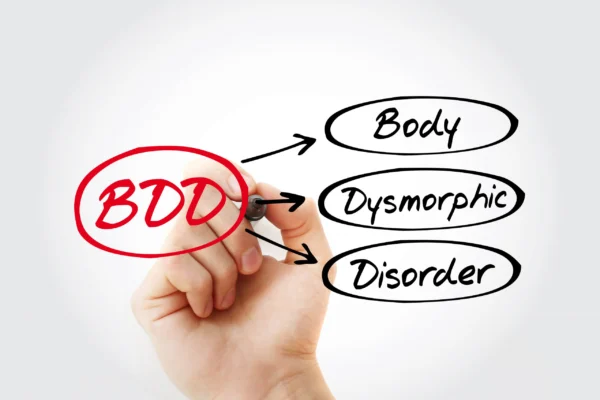“Wait, there’s a difference between the two?” you may ask yourself.
Though the phrases “disordered eating” and “eating disorders” may seem interchangeable, it’s essential to recognise that there’s a deviation that sets these two conditions apart.
While many of us are familiar with the term “eating disorders,” disordered eating is a lesser-known issue that takes various forms and can significantly impact our mental and physical well-being.
It could even be a stepping stone towards developing an eating disorder. So, let’s dive into the question: “Is disordered eating the gateway to eating disorders?”
In this blog, we’ll explore the connection between these two conditions and why early intervention for disordered eating might be crucial in halting the escalation of symptoms
What Is ‘Disordered Eating’?
Disordered eating is a complex and often misunderstood phenomenon that describes a range of unhealthy eating habits.
It is not a clinical diagnosis, but rather, refers to abnormal eating behaviours that can manifest in many different ways, from binge eating to restricting food intake, and can have serious physical and emotional consequences.
The roots of disordered eating lie in a combination of genetic, psychological, and environmental factors, including family history, cultural pressures to conform to unrealistic body ideals, and personal trauma. Individuals struggling with the condition often experience shame, guilt, and anxiety around meals, as well as distortions in their body image and self-worth.
While disordered eating is not a diagnosis on its own, it can be a warning sign of more severe eating disorders and other mental health issues.
How Do I Spot Symptoms of Disordered Eating?
It can be challenging to detect, but it’s essential to know the signs and symptoms. Whether you’re concerned about your relationship with food or someone close to you, there are certain behaviours and patterns to watch out for.
Some examples include:
Obsessive Thoughts About Food, Eating, or Weight:
Our relationship with food is one of life’s most complex connections, and for some, it can become an obsession. However, when food, eating, and weight dominate our thoughts and actions, it’s a sign of disordered eating.
This can manifest in various ways, such as constantly thinking about food and planning meals, obsessively weighing oneself, or fixating on calorie counts and nutrition labels.
Creating Rigid Rules Around Eating:
Creating strict rules and rituals around eating may seem like a healthy approach to food, but in reality, it’s a clear sign of disordered eating.
People who suffer from the condition often restrict food intake and follow strict, self-imposed dietary regulations. This can manifest in various ways, such as obsessive calorie counting, avoiding certain food groups, or ritualistic behaviours, such as cutting food into only specific shapes.
Struggling To Eat Around Others:
Eating is a basic human need that should come naturally to us. However, for some people, eating in front of others can be an intimidating and challenging task.
Inability/difficulty to eat in front of others is a common sign. This behaviour may look like avoiding eating in social situations or restricting food intake altogether.
But why?
People who are struggling with disordered eating may feel a strong sense of shame or embarrassment around food and eating. They may also experience anxiety or fear about being judged based on what they eat or how much they consume.
Extreme Changes In Diet:
The concept of extreme changes in diet can seem innocent enough at first glance, but it often signifies something more troubling at play. Disordered eating can show up in various ways, and one of them is through obsession with specific diet trends.
This can lead to an all-or-nothing mentality, where individuals believe that “all carbs are bad” or must completely eliminate entire food groups to be healthy.
How Do I Spot Disordered Eating In Others?
It can be concerning to notice a friend or loved one exhibiting signs of this condition, but recognising those patterns is crucial to help them get the support they need.
Disordered eating can take many forms, but there are specific emotional and physical symptoms that may indicate a problem.
For example, a person may become withdrawn or secretive about their eating habits or experience changes in weight, sleep patterns, or mood.
It’s important to note, however, that everyone’s struggle with disordered eating may look different, so it’s vital to understand what to look for in each case and offer support, compassion, and resources for recovery.
Early Intervention: The Game Changer
Disordered eating behaviours can often be addressed and prevented with the proper intervention. However, if left unchecked, it can lead to more severe conditions such as anorexia, bulimia, or binge eating disorder.
Therefore, early intervention strategies are crucial in preventing someone from developing a full-blown eating disorder.
Early intervention can help individuals identify their harmful behaviour and make positive changes before it progresses to a more severe level. This can involve working with a mental health professional or a registered dietitian to address any underlying psychological or nutritional issues. By addressing the condition early on, individuals have a greater chance of preventing the development of a more serious and life-threatening eating disorder.
Conclusion:
Disordered eating and eating disorders are related but different. Symptoms of disordered eating may include counting calories excessively, constantly worrying about food and weight, and skipping meals.
These behaviours can lead to an eating disorder if left unchecked.
Early intervention is critical to preventing the transition from disordered eating to a more serious condition. Recognising the signs in oneself or a loved one is the first step towards seeking help.
Eating disorders are notoriously difficult to treat, making early intervention even more necessary. By getting help early, individuals experiencing disordered eating can avoid further damage to their health and begin a journey towards recovery and well-being.
Call us today to get the support you need to address your relationship with food and live a more fulfilling life.













